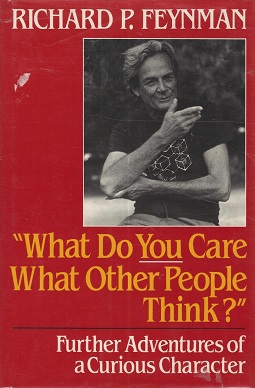 I’m going to break my standard format here and talk about two books in the same entry: Surely You’re Joking, Mr. Feynman! and What Do You Care What Other People Think? They are both collections of autobiographical stories and accounts from famed physicist Richard Feynman’s life. I’m combining discussion of these because they are both very similar books and fit well together in a single entry.
I’m going to break my standard format here and talk about two books in the same entry: Surely You’re Joking, Mr. Feynman! and What Do You Care What Other People Think? They are both collections of autobiographical stories and accounts from famed physicist Richard Feynman’s life. I’m combining discussion of these because they are both very similar books and fit well together in a single entry.
Both books attribute Feynman as the author, however, these are not typical memoirs. Both are a collection of miscellaneous stories from Feynman’s life, some long and some short, some of them serious and some of them amusing anecdotes. Much of these were transcribed from verbal stories and interviews he gave with friends that were edited and assembled into book format. Photos, drawings and letters are also included in the latter book. I have seen What Do You Care listed as a sequel to Surely You’re Joking, although the content is not actually sequential. However, both books cover different topics and events, so if you only read one or the other, you’ll miss out.
Rather than give a detailed outline of all the very specific stories told within each book, I think it’s more insightful if I give a general description of the man they’re about.
Most of the world knows of Richard Feynman as a very famous scientist in the 20th century. They might also know of his famed “Feynman Diagrams,” or his general work in quantum physics, or that he won the Nobel Prize, that he worked on the Manhattan Project, that he helped develop the use of IBM punchcards for computers, or that he was part of the team that discovered the cause of the Challenger explosion. However, just being smart or famous or influential doesn’t necessarily make you interesting. I’m sure there are lots of scientists and scholars who have done amazing work and published great things, but are not people you want to read about.
Richard Feynman is not one of those people. He was not only extremely influential but also a completely fascinating and (pardon the lack of eloquence) totally awesome as a man, someone I have admired for a long time. He was far more than just a scientist and to describe him solely as that feels like selling him short. He had eclectic interests in other fields: from biology to bongos. He fixed radios as a very young child and played with chemistry. As an adult, he was a prankster and a playful troublemaker. He did amateur safecracking and lockpicking, he wrote and deciphered codes. He dabbled in art, biology and other fields. He did crazy experiments with ant pheromones and obsessed over puzzles and finding answers. He crept into the desert at night and danced with local American Indians. When he taught in Brazil, he played the frigideira in a samba group. At Caltech, he used to use a strip club as his personal office, and testified on their behalf when the city tried to shut them down. In short, he was not a very typical guy.
 If you read accounts from his students, you will hear about what a fabulous teacher he was. Person after person after person says the same things about him: he was so excited about the topic that it made you excited, too. He was inspiring. He made even the most complex things understandable and was well renowned for this ability. He told fabulous stories. He was a great man.
If you read accounts from his students, you will hear about what a fabulous teacher he was. Person after person after person says the same things about him: he was so excited about the topic that it made you excited, too. He was inspiring. He made even the most complex things understandable and was well renowned for this ability. He told fabulous stories. He was a great man.
I mention all of these different things because they will give you a better perspective of what these books are about more than anything else I could write. Yes, the critical events of his life are here and yes, you will read about him working on the atomic bomb, about winning the Nobel Prize, about the faulty o-rings on the Challenger shuttle. You will also read many personal stories from his life and about his work, funny and sad and dramatic. But these events are just the backdrop: the more wonderful aspect of these two books is the showcase of the man himself: his personality. The book paints a picture of a man who has a compelling need to solve puzzles, try new things, make discoveries, face challenges, find answers. They portray him doing things with a passionate enthusiasm and charming sense of humour. You understand exactly what those students meant; you become excited about things because he is excited about those things. His drive is contagious.
What ultimately results from all this is an autobiographical account that is far more insightful than a book that simply provides a timeline of events. It might not inspire the same excitement as sitting in on one of his famed “freshman lectures” but I think readers will find Richard Feynman to be as compelling and admirable as he has been described to be.
Surely You’re Joking, Mr. Feyman! in paperback / kindle
What Do You Care What Other People Think? in paperback / kindle
